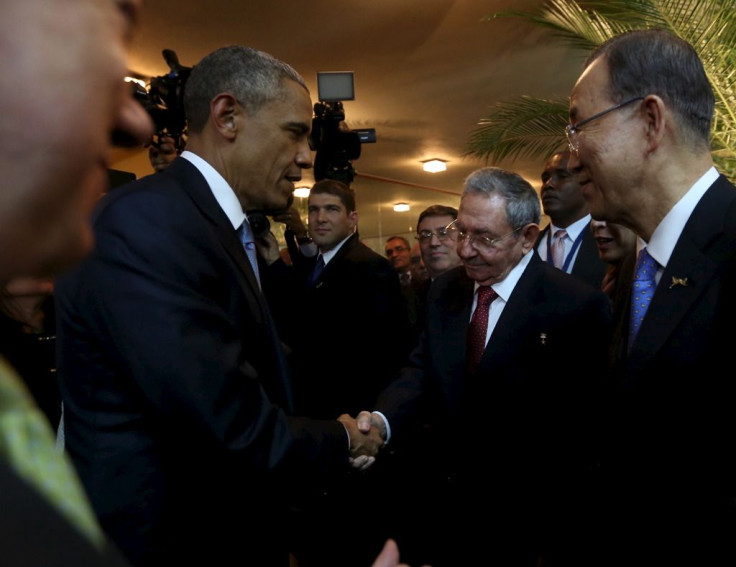Obama, Castro Shake Hands As US-Cuba Relations Thaw

U.S. President Barack Obama shook hands with Cuban President Raul Castro on Friday, signaling the rekindling of relations between the two countries that had been cold for over half a century.
At the Summit of the Americas in Panama city, the two world leaders shook hands at a time when both countries are moving toward diplomatic normalization, a historic policy change that Obama announced in December.
The White House confirmed the interaction in a statement, but said it was informal and the two did not engage in serious discussions, according to the Associated Press (AP). They are expected to speak further on Saturday, where the issue is reportedly set to take center stage at the summit.
The two leaders previously shook hands briefly in 2013 during the memorial service for Nelson Mandela, but that greeting did not lead anywhere.
“As the United States begins a new chapter in our relationship with Cuba, we hope it will create an environment that improves the lives of the Cuban people,” Obama said, speaking to a gathering of civil groups, the AP reported. “Not because it is imposed by us, the United States, but through the talent and ingenuity and aspirations, and the conversations among Cubans from all walks of life so they can decide what the best course is for their prosperity."
"The days in which our agenda in this hemisphere presumed that the United States could meddle with impunity, those days are past,” he added.
As Washington seeks to reopen diplomatic channels with Cuba, its relations with the latter's closest ally Venezuela have worsened. The tensions arose last month when Obama imposed sanctions against a group of Venezuelan officials accused of human rights abuses, calling the situation a “national emergency” and declaring Venezuela a national security threat to the U.S.
The decisions have been widely condemned by a regional group of South American nations, who called them “unilateral coercive measures against International Law.”
Former Cuban leader Fidel Castro also penned a letter of support to Venezuelan President Nicolas Maduro where he said that Venezuela would “never accept threats.”
High on the list of Cuba’s demands from Washington is that it be struck off the list of countries that sponsor terrorism. The U.S. has kept a crippling embargo in place against the island nation since 1982. The State Department delivered a report on the matter to the White House on Wednesday, and Obama said a White House team will look at its recommendations. The White House reportedly said it isn’t ruling out a final decision before Obama leaves Panama late Saturday.
While visiting Jamaica on Thursday, Obama said that the list of designated terror supporters would be updated as circumstances change. “We want to make sure that given that this is a powerful tool to isolate those countries that genuinely do support terrorism, that when we make those designations we've got strong evidence that, in fact, that's the case ... as circumstances change, then the list will change as well,” he said. However, Obama stressed he would not stop pressing Cuba on its record on human rights.
Shortly before Obama addressed the civil society groups, the Cuban government tried to block access to dissidents in the gathering, the New York Times reported.
© Copyright IBTimes 2024. All rights reserved.











